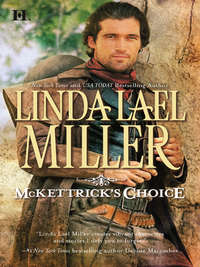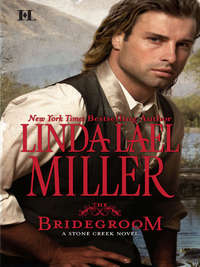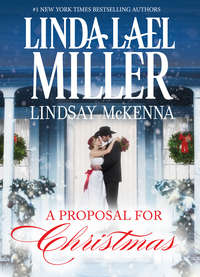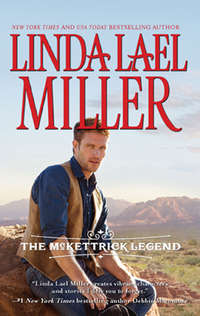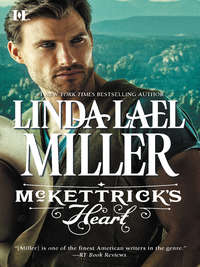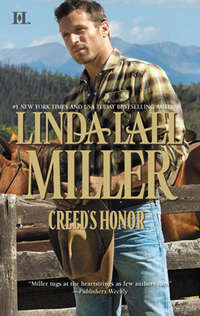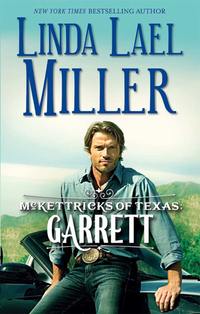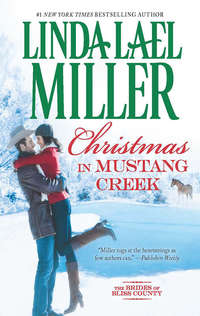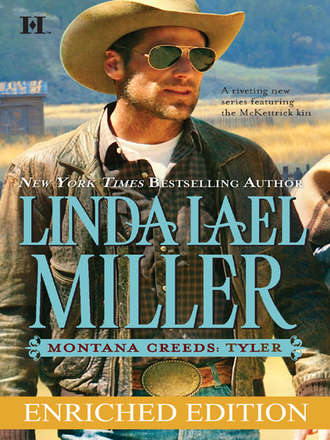
Полная версия
Montana Creeds: Tyler

Dear Reader,
Welcome to the third of three books about the rowdy McKettrick cousins, the Creeds.
Tyler Creed, the youngest of the Creed brothers and the one with the hottest temper and the biggest chip on his shoulder, is determined NOT to have anything to do with his two brothers or their new enterprise, Tri-Star Cattle Company. The same might go for Lily Ryder Kenyan, the girl he dated and betrayed back in the day. But there’s one problem. Lily isn’t a girl anymore; she’s a beautiful, passionate woman. And the two of them strike sparks off each other in this red-hot, very sexy story.
I also wanted to write today to tell you about a special group of people with whom I’ve recently become involved. It is the Humane Society of the United States (HSUS), specifically their Pets for Life program.
The Pets for Life program is one of the best ways to help your local shelter—that is, to help keep animals out of shelters in the first place. It offers tips as basic as keeping a collar and tag on your pet all the time, so if he gets out and gets lost, he can be returned home; being a responsible pet owner; spaying or neutering your pet; and not giving up when things don’t go perfectly. If your dog digs in the yard or your cat scratches the furniture, know that these are problems that can be addressed. You can find all the information about these—and many other common problems—at www.petsforlife.org. This campaign is focused on keeping pets and their people together for a lifetime.
As many of you know, my own household includes two dogs, two cats and four horses, so this is a cause that is near and dear to my heart. I hope you’ll get involved along with me.
With love,

Praise for the novels of
LINDA LAEL MILLER
“As hot as the noontime desert…Well-developed, personable characters and a handful of loose ends will leave readers anticipating future installments.”
— Publishers Weekly on The Rustler
“Loaded with hot lead, steamy sex and surprising plot twists.”
— Publishers Weekly on A Wanted Man
“Miller’s prose is smart, and her tough Eastwoodian cowboy cuts a sharp, unexpectedly funny figure in a classroom full of rambunctious frontier kids.”
— Publishers Weekly on The Man from Stone Creek
“[Miller] paints a brilliant portrait of the good, the bad and the ugly, the lost and the lonely, and the power of love to bring light into the darkest of souls. This is western romance at its finest.”
— Romantic Times BOOKreviews on The Man from Stone Creek
“Intrigue, danger and greed are up against integrity, kindness and love in this engrossing western romance. Miller has created unforgettable characters and woven a many-faceted yet coherent and lovingly told tale.”
— Booklist on McKettrick’s Choice (starred review)
“An engrossing, contemporary western romance…Miller’s masterful ability to create living, breathing characters never flags…combined with a taut story line and vivid prose, Miller’s romance won’t disappoint.”
— Publishers Weekly on McKettrick’s Pride (starred review)
“Linda Lael Miller creates vibrant characters and stories I defy you to forget.”
—#1 New York Times bestselling author Debbie Macomber
Linda Lael Miller
Montana Creeds: Tyler

For Katherine “KO” Orr and Marleah Stout,
my pals. Loves ya’s.
CONTENTS
CHAPTER ONE
CHAPTER TWO
CHAPTER THREE
CHAPTER FOUR
CHAPTER FIVE
CHAPTER SIX
CHAPTER SEVEN
CHAPTER EIGHT
CHAPTER NINE
CHAPTER TEN
CHAPTER ELEVEN
CHAPTER TWELVE
CHAPTER THIRTEEN
CHAPTER FOURTEEN
CHAPTER FIFTEEN
CHAPTER SIXTEEN
CHAPTER SEVENTEEN
CHAPTER EIGHTEEN
CHAPTER NINETEEN
CHAPTER TWENTY
EPILOGUE
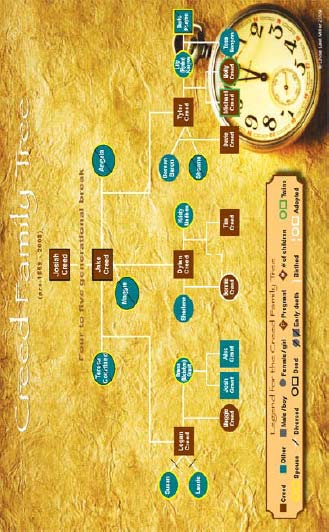
CHAPTER ONE
T YLER C REED SUPPRESSED a grin as the old guy in the Wal-Mart parking lot stared, dumbfounded, at the fancy set of keys resting in his work-roughened palm. Blinked a couple of times, like somebody trying to shake off an illusion, then gave the brim of his well-worn baseball cap an anxious tug. According to the bright yellow stitching on the hat, his name was Walt and he was the world’s greatest dad.
Walt looked at his ten-year-old Chevy truck, the sides streaked with dry dirt, the mud flaps coated, and then shifted to stare at Tyler’s shiny white Escalade.
“I thought you was kiddin’, mister,” he said. “You really want to trade that Cadillac, straight across, for my old rig? It’s got near a hundred thousand miles on it, this junker, and every once in a while, a part falls off. Last week, it was the muffler—”
Tyler nodded, weary of Walt’s prattle but not about to show it. “That’s the idea,” he replied quietly.
The aging redneck approached the Cadillac, touched the hood with something like reverence. “Is this thing stolen?” Walt asked, understandably suspicious. After all, Tyler reflected, a man didn’t run across a deal like that every day, especially in Crap Creek, Montana, or whatever the hell that wide spot in the road was called.
Tyler chuckled. “No, sir,” he said. “I own it, fair and square. The title’s in the glove compartment. You agree, and I’ll sign off on it right now, and be on my way.”
“Wait till Myrtle comes out with the groceries and sees this,” the old fella marveled, hooking his thumbs in the straps of his greasy bib overalls, shaking his head once and finally cutting loose with a gap-toothed smile. Walt needed dental work.
Tyler waited.
“I still don’t understand why any sane man would want to make a swap like this,” Walt insisted. “Could be, you’re not right in the head.” He paused, squinted up into Tyler’s impassive face. “You look all right, though.”
Involuntarily, Tyler glanced at his watch, an expensive number with a twenty-four-karat-gold rodeo cowboy riding a bronc inlaid in the platinum face. Diamonds glittered at the twelve, three, six and nine spots, and the thing was as incongruous with who he was as the pricey SUV he was virtually giving away, but he’d never considered parting with the watch. His late wife, Shawna, had sold her horse trailer and a jeweled saddle she’d won in a barrel racing event to buy it for him, the day he took his first championship.
“I don’t know as I’m eager to trade with a man in a hurry,” Walt said astutely, narrowing his weary eyes a little. “You’re runnin’ from somethin’, and it might be the law. I don’t need that kind of trouble, I can tell you. Myrtle and me, we got ourselves a nice life—nothin’ fancy—I worked at the lumber mill for thirty years—but the double-wide is paid off and we manage to scrape together ten bucks for each of the grandchildren on their birthdays—”
Tyler suppressed a sigh.
“That’s some watch,” Walt observed, in no particular hurry to finalize the bargain. The wise gaze took in Tyler’s jeans and shirt, newly purchased at rollback prices, lingered on his costly boots, handmade in a specialty shop in Texas. Rose again to his black Western hat, pulled low over his eyes. “You win it rodeoin’ or somethin’?”
“Or something,” Tyler confirmed. His own brothers, Logan and Dylan, didn’t know about his marriage to Shawna, or the accident that had killed her; he wasn’t about to confide in a stranger he’d met in the parking lot at Wal-Mart.
“You look like a bronc-buster,” Walt decided, after another leisurely once-over. “Sorta familiar, too.”
You look like a forklift driver, Tyler responded silently. He looped his thumbs in the waistband of his stiff new jeans. “Deal or no deal?” he asked mildly.
“Let me see that title,” Walt said, still hedging his bets. “And some identification, if you don’t mind.”
Knowing it wouldn’t matter if he did mind, Tyler fetched the requested document from the SUV, pausing to pat the ugly dog he’d found half-starved in another parking lot, in another town, on the long road home.
“Dog part of the swap?” Walt asked, getting cagier now.
“No,” Tyler said. “He stays with me.”
Walt looked regretful. “That’s too bad. Ever since my blue tick hound, Minford, died of old age last winter, I’ve been hankerin’ to get me another dog. They’re good company, and with Myrtle waitin’ tables every day to bank-roll her bingo habit, I’m alone a lot.”
“Plenty of dogs in need of homes,” Tyler pointed out. “The shelters are full of them.”
“Reckon that’s so,” Walt agreed. He studied the title Tyler handed over like it was a summons or something. “Looks all right,” he said. “Let’s see that ID.”
Tyler pulled his wallet from his hip pocket and produced a driver’s license.
Walt’s rheumy eyes widened a little, and he whistled, low and shrill, in exclamation. “Tyler Creed,” he said. “I thought I’d heard that name before, when I saw it on the title to this Caddie of yours. Four times world champion bronc-rider. Seen you on ESPN many a time. In some TV commercials, too. Takes guts to stand in front of a camera wearing nothing but boxer-briefs and a shit-eatin’ grin the way you done, but you pulled it off, sure as hell. My daughter Margie has a calendar full of pictures of you—two years out of date and she still won’t take it down off the wall. Pisses her husband off somethin’ fierce.”
Inwardly, Tyler sighed. Outwardly, he stayed cool.
“Myrtle and me, we’d be glad to have you come to our place for supper,” Walt went on.
“No time,” Tyler said, hoping he sounded regretful.
Walt looked him over once more, shook his head again and got his own paperwork out of that rattletrap truck of his. Signed his name on the dotted line. “Just let me fetch my toolbox out of the back,” he said.
“I’ll get my own gear while you’re doing that,” Tyler answered, relieved.
The switch was made. Tyler had his duffel bag, his dog and his guitar case in the Chevy before Walt set his red metal toolbox in the back of the Escalade.
“Sure you won’t come to supper?” Walt asked, as a woman emerged from Wal-Mart and headed toward them, pushing a cart and looking puzzled.
“Wish I could,” Tyler lied, climbing into the Chevy. If he drove hard, he and Kit Carson, the dog, would be in Stillwater Springs by the time the sun went down. They’d lie low at the cabin overnight, and come morning, he’d find his brother Logan and punch him in the face.
Again.
Maybe he’d put Dylan’s lights out, too, for good measure.
But mainly, heading home was about facing up to some things, settling them in his mind.
“See you,” he told Walt.
And before the old man could answer, Tyler laid rubber.
Five miles outside Crap Creek, the Chevy’s muffler dropped to the blacktop and dragged, with an earsplitting clatter, throwing blue and orange sparks.
“Shit,” Tyler said.
Kit Carson gave a sympathetic whine.
Well, he’d wanted to go back and find out who he’d have been without the rodeo, the money and Shawna. This was country life, for regular folks.
And it wasn’t as if Walt hadn’t warned him, he thought.
With a grimace, Tyler pulled to the side of the road, shut the truck off and scooted underneath the pickup on his back, with damage control on his mind. Just like the bad old days, he reflected, when he and his dad, Jake, had played shade-tree mechanic in the yard at the ranch, trying to keep some piece-of-shit car running until payday.
Whatever Walt’s other talents might be, muffler repair wasn’t among them. He’d duct-taped the part in place, and now the tape hung in smoldering shreds and the muffler looked as though somebody had peppered it with buckshot.
Tyler sighed, shimmied out from under the truck again and got to his feet, dusting off his jeans and trying in vain to get a look at the back of his shirt. Kit sat in the driver’s seat, nose smudging up the window, panting.
Easing the dog back so he could get his cell phone out of the dirt-crusted cup well in the truck’s console, Tyler called 411 and asked to be connected to the nearest towing outfit.
L ILY K ENYON WASN’T HAVING second thoughts about staying on in Montana to look after her ailing father as she and a nurse muscled him into her rented Taurus in front of Missoula General Hospital. She was having forty-third thoughts, seventy-eighth thoughts; she’d left second ones behind about half an hour after she and her six-year-old daughter, Tess, rushed into the admittance office a week before, fresh from the airport.
Lily had remembered her father as a good-natured if somewhat distracted man, even-tempered and funny. Until her teens, she’d spent summers in Stillwater Springs, sticking to his heels like a wad of chewing gum as he saw four-legged patients in his veterinary clinic, trailing him from barn to barn while he made his rounds, tending sick cows, horses, goats and barn cats. He’d been kind, referring to her as his assistant and calling her “Doc Ryder,” and it had made her feel proud, because that was what folks in that small Montana community called him .
In those little-girl days, Lily had wanted to be just like her dad.
Now, though, she was having a hard time squaring the man she recalled with the one her bitter, angry mother described after the divorce. The one who never showed up on the doorstep, sent Christmas or birthday cards, or even called to ask how she was.
Let alone sent a plane ticket so she could visit.
Now, after seven long days of putting up with his crotchety ways, she understood her mom’s attitude a little better, even though it still smarted, the way Lucy Ryder Cook could never speak of her ex-husband without pursing her lips afterward. Hal Ryder, aka Doc, seemed fond of Tess, but every time he looked at Lily, she saw angry, baffled pain in his eyes.
Once her father and daughter were buckled in, Hal in the front and Tess in the special booster seat the law required of anyone under a certain age and height, Lily slid behind the wheel and tried to center herself. The day was hot, even for July; the hospital had been blessedly cool, but the vents on the dashboard of the rental were still huffing out blasts of heat.
Sweat dampened the back of Lily’s sleeveless blouse; without even turning a wheel, she was already sticking to the seat.
Not good.
“Can we get hamburgers?” Tess piped from the backseat.
“No,” said Lily, who placed great stock in eating healthfully.
“Yes,” challenged her curmudgeon of a father, at exactly the same moment.
“Which?” Tess inquired patiently. “Yes or no?” The poor kid was nothing if not pragmatic—stoic, too. She’d had a lot of practice at resigning herself to things since Burke’s “accident” a year before. Lily hadn’t had the heart to tell her little girl what everyone else knew—that Burke Kenyon, Lily’s estranged husband and Tess’s father, had crashed his small private plane into a bridge on purpose, in a fit of spiteful melancholy.
“No,” Lily said firmly, after glaring eloquently at her dad for a moment. “You’re recovering from a heart attack,” she reminded him. “You are not supposed to eat fried food.”
“There’s such a thing as quality of life, you know,” Hal Ryder grumped. He looked thin, and there were bluish-gray shadows under his eyes, underlaid by pouches of skin. “And if you think I’m going to live on tofu and sprouts until my dying day, you’d better think again.”
Lily shifted the car into gear, and the tires screeched a little on the sun-softened pavement as she pulled away from the hospital entrance. “Listen,” she replied tersely, at her wit’s end from stress and lack of sleep, “if you want to clog your arteries with grease and poison your system with preservatives and God only knows what else, that’s your business. Tess and I intend to live long, healthy lives.”
“Long, boring lives,” Hal complained. Lily had stopped thinking of him as “Dad” years before, when it first dawned on her that he wouldn’t be flying her out to Montana for any more small-town, barefoot-and-Popsicle summers. He hadn’t approved of her teenage romance with Tyler Creed, and she’d always suspected that was part of the reason he’d cut her out of his life.
“I’d be happy to hire a nurse,” Lily said, shoving Tyler to the back of her mind and biting her lip as she navigated thickening late-morning traffic. “Tess and I can go back to Chicago if you’d prefer.”
“Don’t be mean, Mom,” Tess counseled sagely. “Grampa’s heart attacked him, remember.”
The image of a ticker gone berserk filled Lily’s mind. If the subject hadn’t been so serious, she’d have smiled.
“Yeah,” Hal agreed. “Don’t be mean. It reminds me of Lucy, and I like to think about her as little as possible.”
Since Lily wasn’t on much better terms with her mother than she was with Hal, she could have done without that last remark. She peeled her back from the seat and fumbled with the air-conditioning, keeping one eye on the road. Her cotton shorts had ridden up, so her thighs were stuck, too, and it would hurt to pull them free.
Another thing to dread.
“Gee, thanks,” she muttered.
“Nana’s a stinker,” Tess commented, her tone cheerful and affectionately tolerant.
“Hush,” Lily said, though she secretly agreed. “That wasn’t a nice thing to say.”
“Well, she is, ” Tess insisted.
“Amen,” Hal added.
“Enough,” Lily muttered. “Both of you. I’m trying to drive, here. Keep us all alive.”
“Slow down a little, then,” Hal grumbled. “This isn’t Chicago.”
“Don’t remind me.” Lily hadn’t intended to sound sarcastic, but she had.
“Is your house big, Grampa?” Tess asked, bravely trying to steer the conversation onto more amiable ground. “Can I have my mom’s old room?”
Lily flashed on the big, rambling Victorian that had once been her home, with its delightful nooks and crannies, its cluttered library stuffed with books, its window seats and alcoves and brick fireplaces. Remembering, she felt the loss afresh, and something squeezed at the back of her heart.
“You can,” Hal said, with a gentleness Lily almost envied. She felt his gaze touch her, sidelong and serious. “Is there a man waiting in Chicago, Lily—is that why you want to go back?”
Lily tensed, searching for the freeway on-ramp, wondering if the question had a subtext. After all, Lily’s mother had left her father for another man, and he hadn’t remarried during the intervening years. Maybe he mistrusted women—his only daughter included. Maybe he expected her to drop everything and run back home to some guy she’d met at Burke’s funeral.
She sighed and shoved a hand into her blond, chin-length hair, only to catch her fingers in the plastic clip she’d used to gather it haphazardly on top of her head that morning before leaving the motel for the hospital. She wasn’t being fair. Her dad had suffered a serious coronary incident, and the doctors and nurses at Missoula General had warned her that depression was common in patients who suddenly found themselves dependent on other people for their care.
Hal Ryder had been doing what he pleased, at least since the divorce. Now, he needed her, a near stranger, to fix his meals, sort out his prescriptions, which were complicated, and see that he didn’t try to mow his lawn or fling himself back into his thriving practice before he was ready.
“Lily?” he prompted.
“No,” she said, after thumbing back through her thoughts for the original question. “There’s no man, Hal.”
“Mom’s a black widow,” Tess explained earnestly.
Hal chuckled. “I wouldn’t go that far, cupcake,” he told his granddaughter.
For a reason Lily couldn’t have explained, her eyes filled with sudden, scalding tears—and she blinked them away. Tears were dangerous on a busy freeway, and besides that, they never made things better. “I’m a widow, ” Lily corrected her daughter calmly. “A black widow is a spider.”
“Oh,” Tess said, digesting the science lesson. She began to thump her sandaled heels against the front of her seat, something she did when she was impatient for the drive to be over.
“Stop,” Lily told her.
A few moments of silence passed. Then Tess went on. “My daddy died when I was four,” she announced.
“I know, sweetheart,” Hal said, his voice tender and a little gruff.
Lily’s throat ached. She’d filed for divorce, after a tearful call from Burke’s latest girlfriend, whom he’d apparently dropped. Would he still be alive if she’d waited, agreed to more marriage counseling, instead of calling a lawyer right after hanging up with the mistress? Would her child still have a father?
Tess had adored her dad.
“His plane hit a bridge,” Tess said.
“Tess,” Lily said gently, “could we talk about this later, please?”
“You always say that.” Tess sighed; she’d been born precocious, but since Burke’s death, she’d been wise beyond her years, an adult in a first-grader’s body. “But later never comes.”
“You can talk to Grampa,” Hal said, slanting another look at Lily. “ I’ll listen.”
Helpless rage filled Lily; her hands, still damp with perspiration even though the air conditioner had finally kicked in, tightened on the steering wheel. I listen, she wanted to protest. I love my child, unlike some people I could name.
To her surprise, her dad reached across the console and patted her arm. “Maybe you ought to pull over for a few minutes,” he said. “Get a grip.”
“I have a grip,” Lily said stiffly, drawing a very deep breath, letting it out and purposely relaxing her shoulders.
“I’m hungry,” Tess said. She never whined, but she was teetering on the verge. No doubt she was picking up on the tension between the adults in the front seat.
Definitely not good.
“We’ll be in Stillwater Springs in under an hour,” Lily said, keeping her tone light. “Can you hold out till we get there?”
“I guess,” Tess said. “But then we’ll have to stop at a supermarket and everything. Grampa told me there’s no food in the house.”
Lily’s head began to pound. She glanced into the rearview mirror, to make eye contact with her daughter. “Okay, we’ll stop,” she said. “We’ll get off at the next exit, find one of those salad buffet places.”
“Rabbit food,” Hal murmured.
“One burger wouldn’t kill us,” Tess said.
Whose side was the child on, anyway?
“No burgers,” Lily said firmly. “Fast-food places don’t offer organic beef.”
“Oh, for Pete’s sake,” Hal said.
“Kindly stay out of this,” Lily told her father evenly. “My purse is on the seat beside you, Tess. There’s a package of crackers inside. Have some, and I’ll keep my eye out for a decent market.”
Sullenly—Tess was never sullen—the child rummaged through Lily’s handbag, found the crackers, tore open the package and munched.
After that, none of them spoke. They were twenty minutes outside Stillwater Springs when they spotted the man and the dog walking alongside the highway.
Something about the man jarred Lily—the set of his shoulders, the way he walked, something— tripping all sorts of inner alarms.
“Stop,” Hal commanded urgently. “That’s Tyler Creed.”
And I thought this day couldn’t get any worse .




